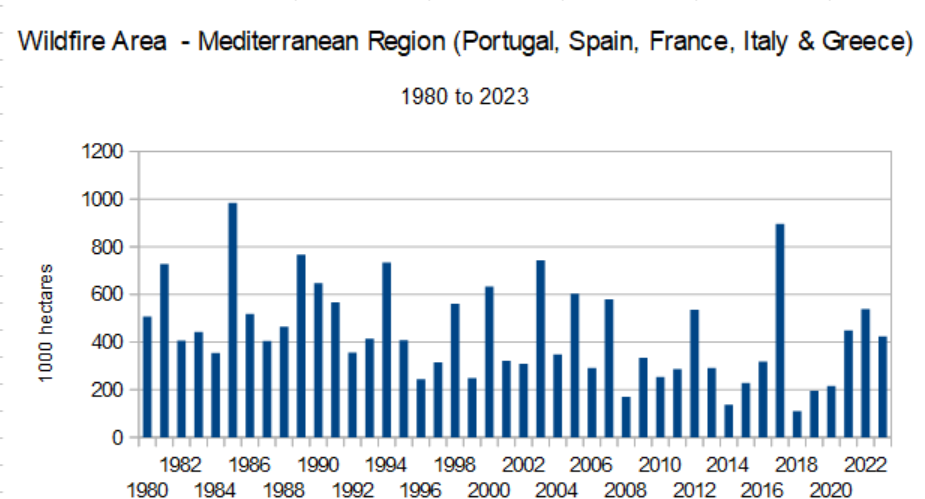LAST week I wrote about how a senior meteorologist at the Met Office had claimed on BBC Radio 5 just after Storm Isha last month that storms in the UK are getting more intense because of climate change. Her exact words were: ‘. . . when we see these storms they are more intense and that’s down to climate change’.
So I sent a Freedom of Information request to the Met Office, asking them to provide evidence of this claim. They quickly responded with the statement that this information is not held. In other words, they have no evidence to back up Clare Nasir’s claim.
They even provided a link to one of their recent reports, which stated: ‘. . . there is no compelling trend in maximum gust speeds recorded in the UK since 1969 . . .’ And another report from just last month, which noted: ‘While our climate overall is getting wetter, there are no compelling trends in increasing storminess in recent decades ‘
Which of course brings us to ask why one of their senior meteorologists told an outright lie?
I have now called upon the Met Office to repudiate this false claim and publish a full correction. Net Zero Watch have also issued a press release challenging them.
Whether Nasir’s seriously misleading claim was intentional, or whether she actually believes the Met Office’s propaganda about extreme weather, either way it is yet more evidence that they are more interested in climate propaganda than the truth.
***
Mediterranean wildfires – facts and fiction
WE ALL recall the massive media hype last summer as wildfires took hold around the Mediterranean. There were dramatic headlines such as ‘Greece is on fire’, ‘Summer of Fire’ and ‘Wildfires: The changing face of the Mediterranean landscape’. The Washington Post went as far to claim that wildfires were threatening the Mediterranean way of life.
It may therefore come as a surprise (but really should not) to learn that the wildfires were not in any way exceptional, according to provisional data from the EU. Overall across Portugal, Spain, France, Italy and Greece, the region which the EU provides separate data for, the burnt area was pretty much average last year.
Moreover it is apparent from the EU data that wildfire acreage has actually been declining since the start of records in 1980. This totally contradicts the usual mantra that global warming is making wildfires worse:

https://notalotofpeopleknowthat.wordpress.com/2024/02/13/eu-wildfire-trends-2023/
Even in Greece, which was hardest hit, wildfires were worse in 2007.
Wildfires are always tragic events for everyone involved, and affect large areas around the Mediterranean every year. In Greece, for instance, more than 1 per cent of the country was hit last year. That is why I am disgusted by attempts to use them as a political football to promote the climate scare. The simple fact is that the region is hot and dry every summer, a tinderbox awaiting a spark. And, as we know, most of the fires in Greece last year were the result of arson – according to the BBC, 79 people were arrested there last summer for starting fires.
There is nothing new about wildfires in Greece. There are even tales in the Iliad and in the writings of the historian Thucydides of great conflagrations in Ancient Greece.
They have nothing to do with climate change.
***
The wildfire that was waiting to happen
EARLIER this month, another wildfire killed more than 100 people in the Valparaiso region of Chile. Unsurprisingly, the media immediately blamed it on climate change.
However, almost as an aside, the report in the Telegraph contained a single paragraph which revealed the true cause: ‘Large forests – which are dominated by non-native and highly flammable trees – have also been planted nearby for logging and paper production, and quickly became engulfed.’
Wildfires have become three times as common in Chile in recent years, according to a recent study in Nature. But the cause is not global warming, as the article claims.
Since the 1990s forestry has become big business in Chile, generating the second biggest export income and 2.7 per cent of GDP. In the Valparaiso region of central Chile, only a tiny percentage of natural forests remain, replaced by dense plantations of mainly pine and eucalyptus.
The latter, which accounts for about a third of plantations, is of course highly inflammable and explosive because of the oil it contains. Indeed its whole life cycle depends on fire, as the seeds need fire to trigger germination. Pine trees also highly flammable because of their resinous sap. It is hardly surprising that the recent fire spread so quickly – we have often seen the same in Australia with their eucalyptus forests.
Both trees are planted because of their rapid growth and usefulness for pulp. The logging companies in Chile are powerful businesses, and have long been criticised for the environmental damage they cause. Safety also appears to be well down the list of their concerns.
This region of Chile has a Mediterranean climate, and is particularly hot and dry during El Niño, which is the case currently. With thousands of square miles of poorly managed, highly flammable forests and a tinderbox of a climate, this was an accident waiting to happen.
It has nothing to do with climate change.

